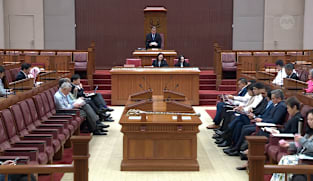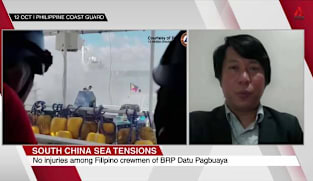Hazel Poa on electoral boundary review process
The process by which electoral boundaries are determined can be reformed in many areas to improve transparency, accountability, independence, fairness and respect for voters - that was the premise of a motion moved by Progress Singapore Party NCMP Hazel Poa in Parliament on Wednesday (Aug 7). Ms Poa put forward a slew of proposals. They included requiring the formation of the Electoral Boundaries Review Committee (EBRC) to be publicly announced immediately, after which it should publish the current number of voters in each constituency based on boundaries in the previous General Election; and requiring the EBRC to publicly and sufficiently explain all changes. She also called for the range of number of voters per MP to be narrowed, to ensure fair representation. Voters should be respected by reducing the potential for gerrymandering, said Ms Poa. She suggested introducing major and minor boundaries which are subject to fixed rules, and requiring changes of major boundaries to be approved by a bipartisan committee. A minimum time frame of three months should also be imposed between the finalising of electoral boundaries and the dissolution of Parliament. This would ensure a more level playing field by giving all political parties time to prepare for the polls, said Ms Poa. Finally, she proposed several ways to enhance independence in the composition, appointment and reporting structure of the EBRC.
The process by which electoral boundaries are determined can be reformed in many areas to improve transparency, accountability, independence, fairness and respect for voters - that was the premise of a motion moved by Progress Singapore Party NCMP Hazel Poa in Parliament on Wednesday (Aug 7). Ms Poa put forward a slew of proposals. They included requiring the formation of the Electoral Boundaries Review Committee (EBRC) to be publicly announced immediately, after which it should publish the current number of voters in each constituency based on boundaries in the previous General Election; and requiring the EBRC to publicly and sufficiently explain all changes. She also called for the range of number of voters per MP to be narrowed, to ensure fair representation. Voters should be respected by reducing the potential for gerrymandering, said Ms Poa. She suggested introducing major and minor boundaries which are subject to fixed rules, and requiring changes of major boundaries to be approved by a bipartisan committee. A minimum time frame of three months should also be imposed between the finalising of electoral boundaries and the dissolution of Parliament. This would ensure a more level playing field by giving all political parties time to prepare for the polls, said Ms Poa. Finally, she proposed several ways to enhance independence in the composition, appointment and reporting structure of the EBRC.



















